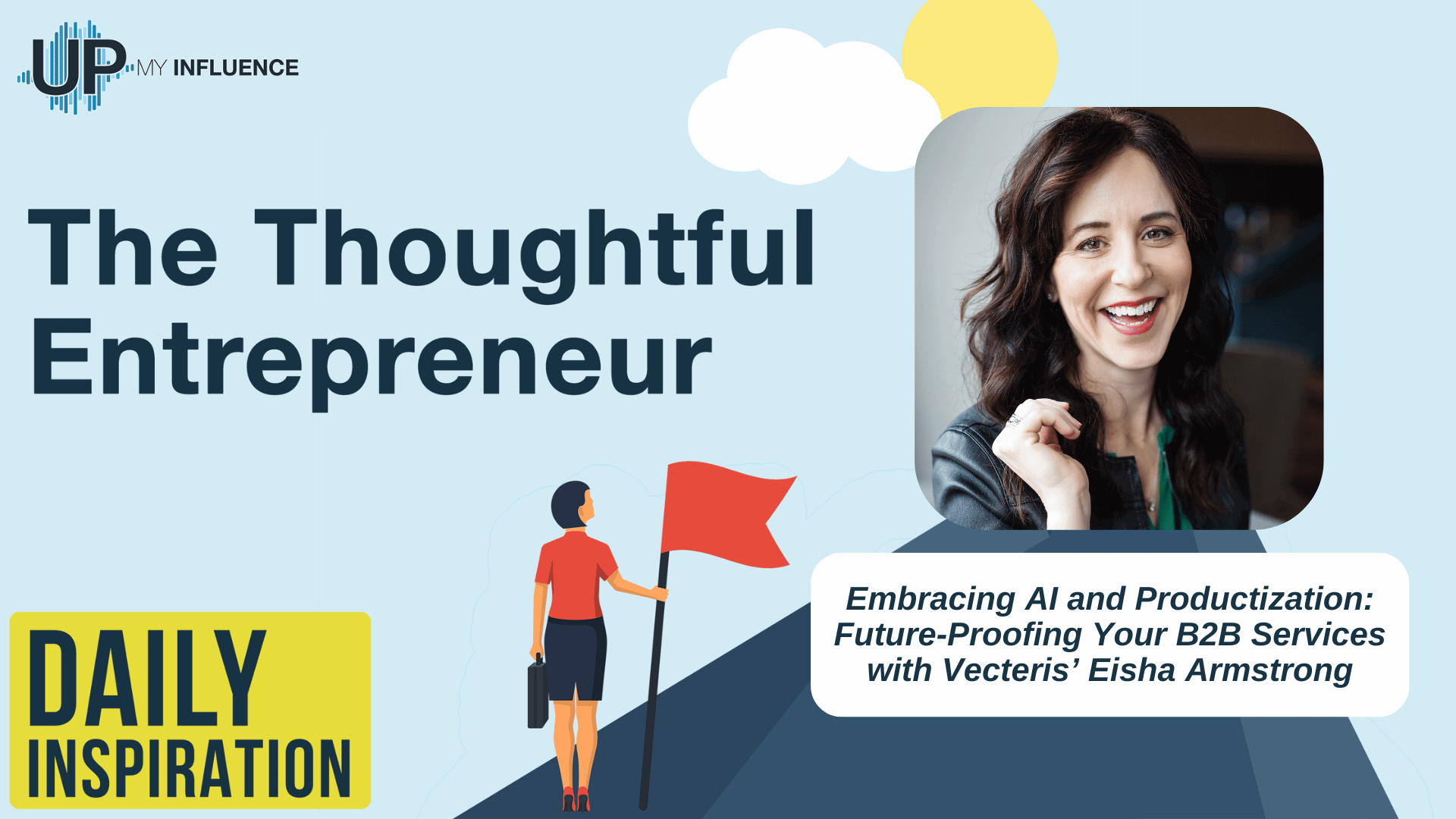THE THOUGHTFUL ENTREPRENEUR PODCAST
 Mastering Productization for B2B Service Providers
Mastering Productization for B2B Service Providers
In a recent episode of the Thoughtful Entrepreneur podcast, host Josh engages in a compelling conversation with Eisha Armstrong, the executive chairman and co-founder of Victorious, and an accomplished author of several influential books, including “Productize,” “Fearless,” and the forthcoming “Commercialize.” The episode delves into the transformative concept of productization, particularly for B2B service providers such as consultants, agencies, and coaches. This blog post will break down the key insights and actionable advice shared by Eisha, providing a comprehensive guide for professionals looking to embrace productization.
Productization is the process of transforming services into standardized, sellable products. For B2B service providers, this means packaging their expertise and intellectual property into offerings that can be scaled and sold repeatedly, rather than trading time for money. Eisha emphasizes that productization is crucial for professionals who often find themselves constrained by the limitations of time-based billing. By shifting to a product-based model, these individuals can scale their businesses, improve profit margins, and create predictable revenue streams. One of the most critical steps in productization is ensuring that there is a demand for your product. Eisha highlights the importance of identifying an “urgent and expensive customer problem” that your product can solve. If your product idea cannot clearly articulate this problem, it may not be viable.
Transitioning to a productized model can be challenging for B2B service providers. Some common obstacles include resistance to change, difficulty in packaging services, and fear of losing the personal touch. Eisha reassures listeners that while the transition may be daunting, the long-term benefits of productization far outweigh the initial hurdles. She advises starting small, educating clients, and investing in customer success. Additionally, Eisha discusses the recent surge in interest in productization due to advancements in generative AI, which can automate tasks and provide data-driven insights. She encourages service providers to explore how AI can be integrated into their productization strategies to stay competitive. As the conversation wraps up, Eisha shares details about her forthcoming book, “Commercialize,” set to be released in September, which addresses the challenges entrepreneurs face when bringing new products to market.
About Eisha Armstrong:
Eisha Armstrong is the Co-Founder and Executive Chairman of Vecteris, dedicated to helping B2B companies transform their services into tangible products. With over 25 years of experience in launching data and information service businesses, Eisha has a proven track record of leading global teams to success.
As an influential business leader, Eisha shares her expertise by advising executives on building cultures that foster product innovation. She authored the best-selling book Productize: The Ultimate Guide to Turning Professional Services into Products and Fearless: How to Transform a Services Culture and Successfully Productize.
Eisha extends her impact beyond Vecteris, serving on Advisory Boards for AMEND Consulting and Gild Collective. She has also contributed to organizations such as Women Helping Women, Cincinnati Early Centers, and Aviatra Accelerators. Committed to empowering women in investing, she is a Limited Partner in Next Wave Impact, aligning her investments with both social impact and financial return.
An accomplished speaker, Eisha has addressed audiences at over 100 leadership development and executive education sessions globally. Her insights have been featured in esteemed publications such as The Financial Times and The Washington Post, and she is a sought-after guest on podcasts focusing on product management and innovation.
Eisha's educational background includes an MBA from the Harvard Business School and a Bachelor of Arts in Women’s Studies and Economics from the University of Kansas. Beyond the boardroom, she is a certified yoga teacher, firmly believing that teaching yoga enhances her executive acumen. Based in Cincinnati with her family, she has a passion for travel and the outdoors. In 2022, she summited Mt. Kilimanjaro alongside her 16-year-old son.
About Vecteris:
Vecteris' solutions help B2B professional services firms develop and commercialize productized offerings. Organizations like CBRE, Black & Veatch, InfoTrust, Ontada, and Euromonitor International use Vecteris' innovative productization solution to grow revenue and transform their organizations.
Our mission is to help organizations build forward-looking products and cultures to positively impact our world.
Vecteris is a WBENC-Certified Women's Business Enterprise.
Apply to be a Guest on The Thoughtful Entrepreneur: https://go.upmyinfluence.com/podcast-guest
Links Mentioned in this Episode:
Want to learn more? Check out Vecteris website at https://www.vecteris.com/
Check out Vecteris on LinkedIn at https://www.linkedin.com/company/vecteris
Check out this free digital copy of Productize: The Ultimate Guide to Turning Professional Services into Scalable Products
Check out Eisha Armstrong website at https://www.eishaarmstrong.com/
Check out Eisha Armstrong on LinkedIn at https://www.linkedin.com/in/eishatierneyarmstrong
Don’t forget to subscribe to The Thoughtful Entrepreneur and thank you for listening. Tune in next time!
More from UpMyInfluence:
We are actively booking guests for our The Thoughtful Entrepreneur. Schedule HERE.
Are you a 6-figure consultant? I’ve got high-level intros for you. Learn more here.
What is your #1 Lead Generation BLOCKER? Take my free quiz here.
Want to learn more about all the podcasts managed by UpMyInfluence? Opt in here.


